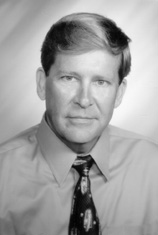 At his office in Grand Island, Neb., David Colan, M.D., uses the opportunity of practicing in a small city to show internal medicine residents a broad perspective of medicine. Without the number of sub-specialists found in larger cities, Dr. Colan sees a wide variety of patients and ailments.
At his office in Grand Island, Neb., David Colan, M.D., uses the opportunity of practicing in a small city to show internal medicine residents a broad perspective of medicine. Without the number of sub-specialists found in larger cities, Dr. Colan sees a wide variety of patients and ailments.
“Our goal here is to demonstrate to residents what practice in Nebraska is like,” Dr. Colan said. “Not practice in Omaha and Lincoln, but practice in a medium-sized community.”
For more than 20 years, Dr. Colan has organized and led the Greater Nebraska Internal Medicine residency rotation in Grand Island at his group practice, Internal Medicine Associates of Grand Island, PC. In recognition of his work, Dr. Colan was named UNMC’s Volunteer Faculty of the Month for February.
“Approximately one-half of the residents that have graduated from our residency program during the past 20 years have spent two months of their training rotating to Dr. Colan’s practice in Grand Island,” said John Gollan, M.D., Ph.D., chairman of the department of internal medicine. “Obviously, Dr. Colan has had a tremendous impact on approximately 120 physicians and their understanding of Greater Nebraska medicine.”
Dr. Colan’s association with UNMC dates back to his medical school days. He earned his medical degree from UNMC in 1973, then served a two-year internship in internal medicine before moving to Grand Island in 1978 to join the internal medicine group practice.
“Grand Island was exactly what I was looking for,” Dr. Colan said. “There aren’t as many sub-specialists as there are in the cities, and it provides the opportunity to see patients of all kinds.”
In addition to his medical practice, Dr. Colan is the co-founder and medical director of Grand Island’s community-based cardiac rehab program, the first of its kind outside of Omaha and Lincoln.
In 1979, he started offering his practice as a place for residents to gain experience in a more rural setting. Dr. Colan finds that residents benefit from their time in Grand Island for the same reasons he does.
“There’s no infectious disease person or geriatrician in town, there’s just you,” he said. “You can consult with Omaha or Lincoln, but the patients come to see you. Residents have said that they see more interesting cases in their two months here than their entire time in other places.”
Although residents are supervised, Dr. Colan says that he gives them a fair amount of latitude when they treat patients. Every experience with a patient teaches the resident something, even if it means making occasional mistakes.
“I believe in forcing them to become responsible for their own decisions,” he said. “We back them up 100 percent and their work is supervised, but the only way to learn is to do.”
Each two-month rotation has mutually beneficial rewards. Residents experience a different side of medicine than what they’re used to seeing, and Dr. Colan has access to residents with the most up-to-date knowledge of medicine.
“I like working with very bright people at that stage in their career,” he said. “It’s a tremendously rewarding experience for both sides.”